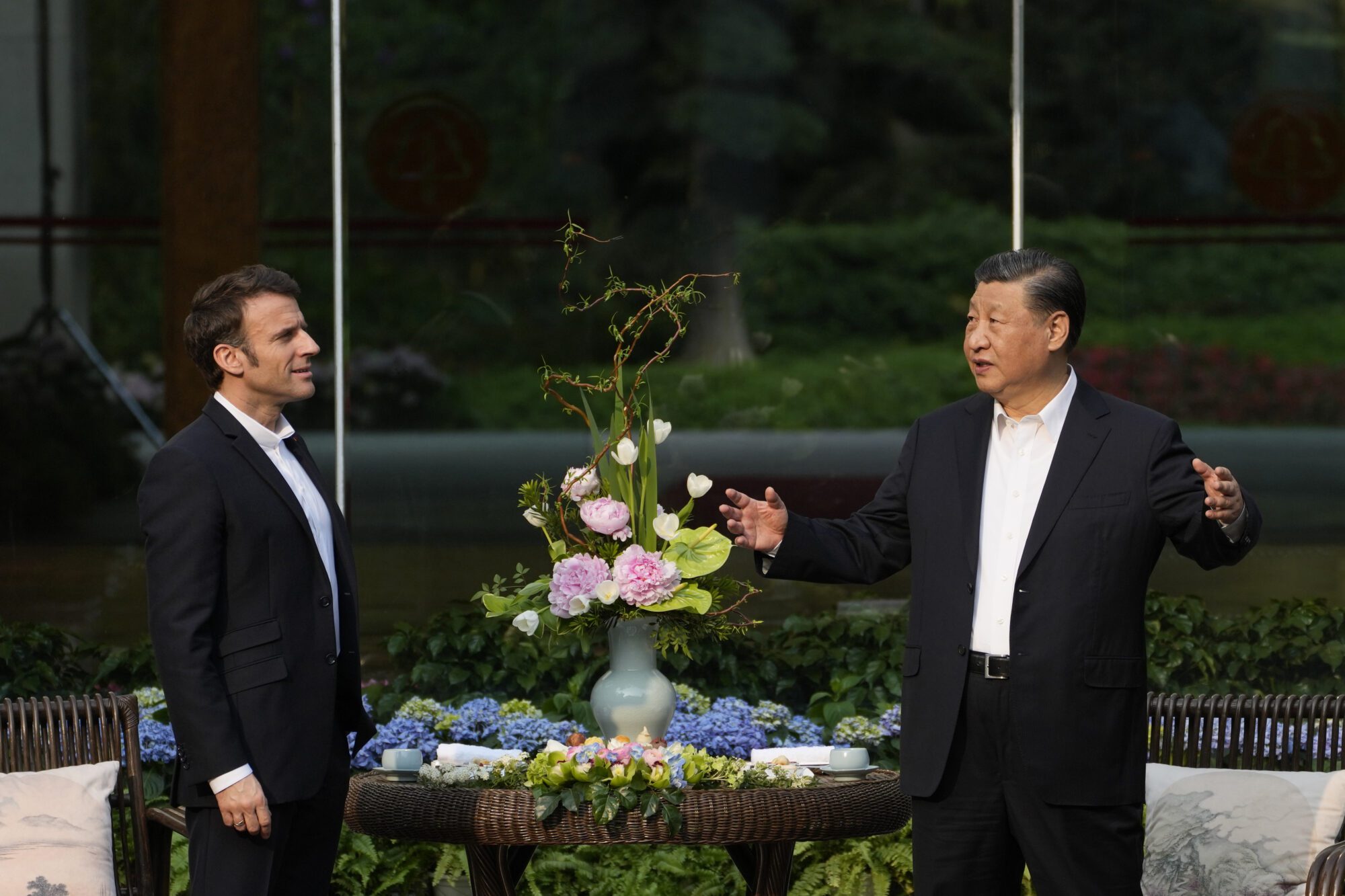
Chinese President Xi Jinping and French President Emmanuel Macron attend a tea ceremony at the Guandong province governor’s residence in Guangzhou on April 7th, 2023.
Thibault Camus / AFP
At the close of French President Emmanuel Macron’s three-day state visit to China, both nations signaled their support for “any effort facilitating the return of peace in Ukraine.”
In a joint statement, released on Friday, April 7th, the two countries came out against armed attacks on nuclear power plants and other non-military nuclear facilities. In particular, they support the International Atomic Energy Agency (IAEA) in its effort to ensure the safety of the Russian-occupied Zaporizhzhya nuclear plant in southeastern Ukraine.
Causing alarm over a potential nuclear disaster, the site was subjected to repeated shelling last year, with both Kyiv and Moscow lobbing accusations at each other over it.
No doubt at Beijing’s request, the joint statement does not mention Russia, nor does it contain any criticism of Moscow’s decision to invade Ukraine. It does stress the importance for all parties in the conflict to “scrupulously respect” international humanitarian law.
The day before, Macron had urged Xi to “bring Russia [an important strategic partner to China] to its senses” regarding its Ukraine strategy—a frequent request from the West, now also regarded by Beijing as important.
While Macron and European Commission President Ursula von der Leyen stated that Xi has shown a willingness to call his Ukrainian counterpart, President Volodymyr Zelensky, Xi later said he, for now, had no intention to do so. The joint statement also makes no mention of such an initiative being in the works.
In something of a rarity for the Chinese leader, on Friday Xi invited Macron to the city of Guangzhou, China’s economic powerhouse in the south. At the governor’s residence in the Guangdong region, where Xi’s father lived for several years, Xi treated Macron to a tea ceremony.
It was the first time since the COVID-19 pandemic that Xi accompanied a visiting leader outside of the capital.
The two leaders ended up conversing for a total of three hours, with Macron as the main party asking questions, and Xi expounding on China’s history and Beijing’s plans for its future development.
Analysts read Xi’s lavishing of special attention on Macron as part of a broader geopolitical strategy. France, with whom China historically has had friendly relations, is viewed by Beijing as the keystone among the European nations. By drawing it closer to itself first, and thereby weakening cohesion among EU member states, it can then try and lure others away from U.S. influence—the reigning yet weakening hegemon with whom China is engaged in a battle for pre-eminence.
Earlier that day, Macron had met a large group of students from a local university, by whom—in stark contrast with his reputation at home—he was enthusiastically greeted.
🇫🇷🇨🇳
— Yena Lee (@yenatweet) April 7, 2023
A rock star welcome for French President Emmanuel Macron: a large crowd of students at Sun Yat-sen University chanted his name and tried to shake his hand upon arrival. Quite a contrast with how he’s greeted back home these days (!)
Now time for his speech + Q&A session … pic.twitter.com/1zjC61hBnY
Reportedly, he was swamped by hundreds of adoring students, clamoring for selfies or the more jejune high-five with the French leader.
During his address to the students in the campus gym, he told them that the war in Ukraine was “a manifest violation of our international law,” with Russia having “decided to colonize its neighbor and not to respect the rules.”
With the international order “now weakened,” he continued, China and France have a responsibility to “preserve it and at the same time to reinvent it in the light of the realities of the 21st century.”Moreover, he asked the students not to let ideology stand in their way of pursuing critical thinking—an implicit critique of the Chinese Communist Party’s guardedness concerning the free flow of ideas and information.
